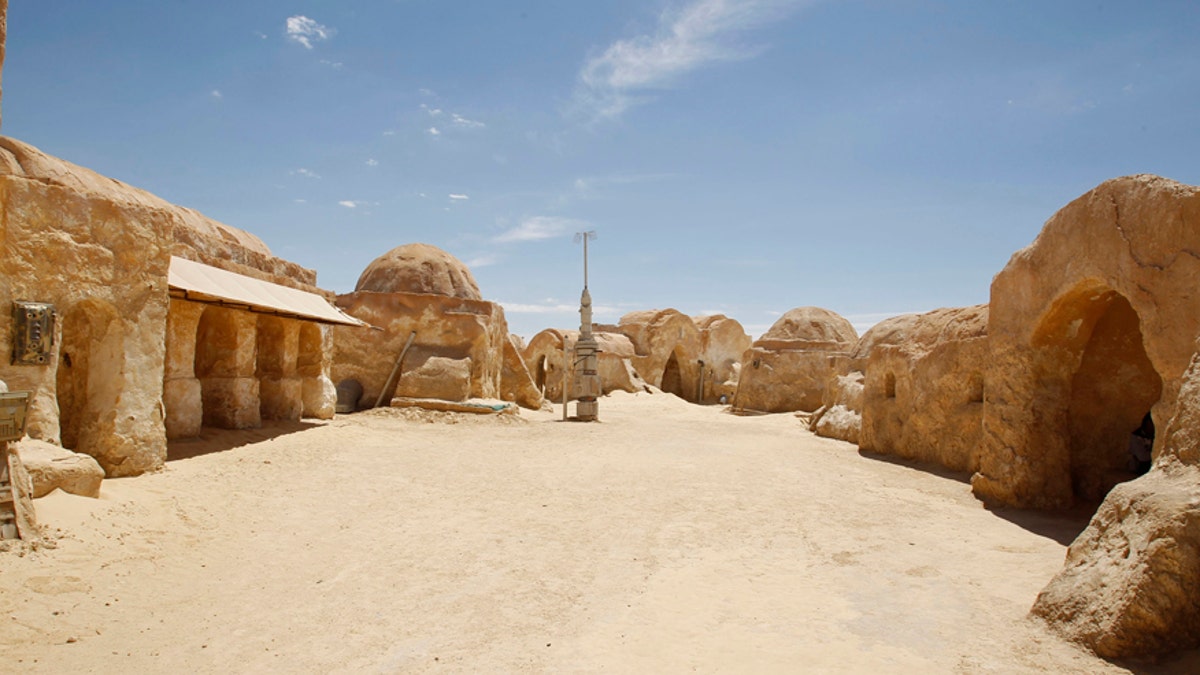
A view of the Star Wars movie set is seen at Ong Jmal, in Nefta, May 3, 2014. (REUTERS/Zoubeir Souissi)
Desert planets with twin sunsets akin to Tatooine – the fictional Earthlike home of Luke Skywalker in “Star Wars: Episode IV”– may exist, according to new research.
Previously, it was believed that rocky planets could not orbit binary stars, and that only gas giant planets similar to Neptune or Jupiter did. However, astrophysicists Ben Bromley of the University of Utah and Scott Kenyon of the Smithsonian Astrophysical Observatory claim that rocky planets orbiting binary stars may very well exist, and there are probably a lot of them.
Stars are formed as clouds of gas collapse from their own gravity. However, the difference in the formation of single stars and binary stars lies in where the gas collapses. Whereas gas collapses first in one region in single-star formation, it collapses in two regions that are in orbit around each other to form twin stars.
“This process is pretty common; a good fraction of stars in the night sky are actually binaries,” Bromley told FoxNews.com. “Not all of them are so close together as in the ‘Star Wars’ movie, but they – and their ‘Tatooines’– may be quite common!”
Planets were thought to form differently orbiting binary stars. While they form around a young single star by joining together with other material to form larger objects, binary stars can scramble this material up unless they are on the optimal orbit. By using computer simulations and mathematic equations, Bromley and Kenyon showed that Earth-sized rocky planets are able to form around twin stars if they have just the right oval, concentric orbit.
“Our job was to map out orbits around a binary star, which can be tricky because the gravity from the pair of stars tugs on planets around them in constantly changing ways,” Bromley added.
The astrophysicists used equations to figure out how exactly a planet’s position changes in time. These equations can reveal large orbital properties, and showed that some orbits are gentle, offering an optimal environment for planet growth.
“We ran simulations by coding the laws of physics and tracking the detailed motions of binary stars and bodies orbiting around them on a computer,” Bromley explained. “They allowed us to include more physics, like the effects of a disk of gas or the presence of Jupiter-size planets. They gave us confidence that the ideas offered up in the equations held true in the environment around real binary stars,” he added.
To test their simulations, they turned to one of Earth’s giant neighboring planets. “Scott Kenyon and I study planet formation with simulations, but it is not always easy to test our understanding,” Bromley said. “So we look to things ‘close by’ in our own solar system. It turns out Pluto and its big moon, Charon, are a binary planet [meaning both are of planetary mass], and they have four small moons, beautifully arranged around them. We were led to our results on ‘Tatooines’ by trying to simulate Pluto's moons.”
Their simulations showed that growing Earth-like planets could survive indefinitely without collisions while orbiting binary stars in a concentric, oval-shaped pattern.
“Like other astronomers, we leapt at the connection with Luke Skywalker's home in Star Wars,” Bromley said. “I love the sunset scene on Tatooine. Those double stars inspired many of us to picture Earth-like planets in exotic, far away places. It is nice that these planets may really exist.”
According to Bromley, while space telescopes haven’t spotted these planets yet due to their small size in comparison to gas-giants, they’d likely have no problem forming right where they need to in order to support life.








































